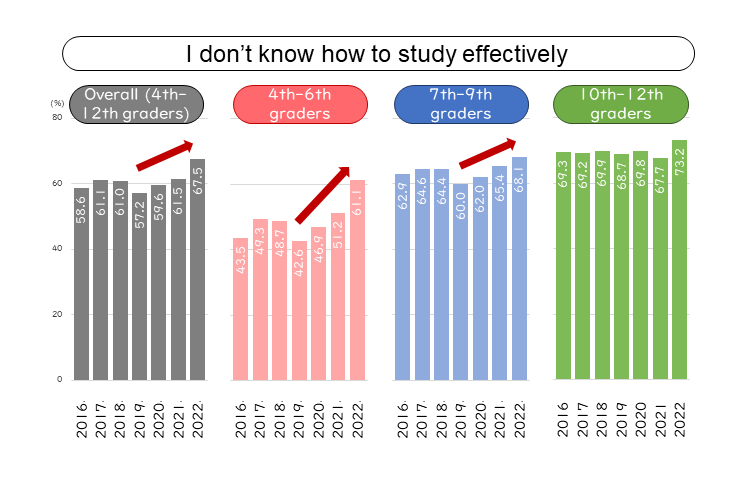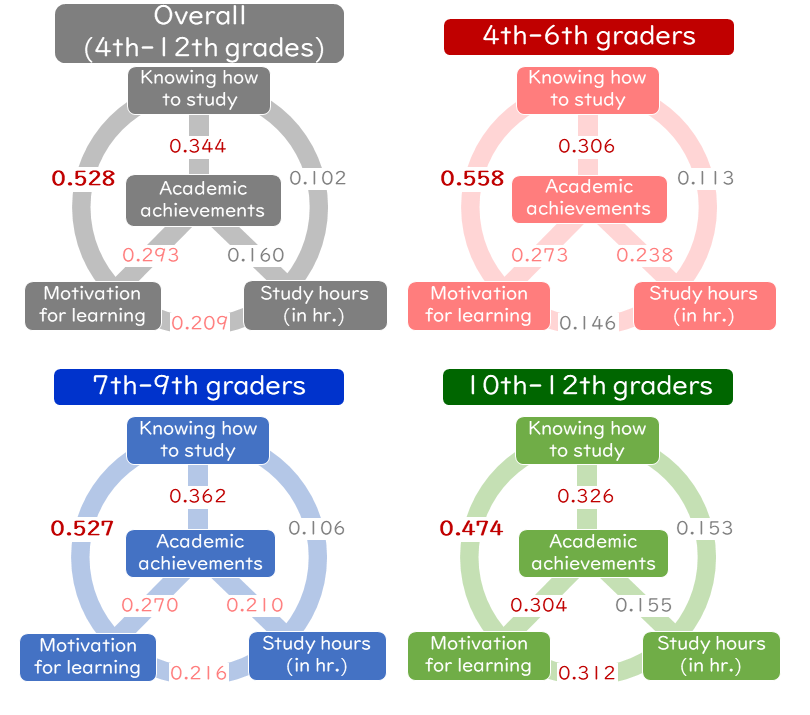The number of children who do not know how to study effectively is increasing, accounting for about 70 percent of surveyed children
The results revealed that "knowing how to study" can improve children's motivation for learning and academic achievements
The Institute of Social Science, the University of Tokyo (Location: Bunkyo-ku, Tokyo; President: Teruo Fujii) and the Benesse Educational Research & Development Institute (BERD) launched a joint research project to clarify the present aspects of "Everyday Life and Learning of Children" in 2014. The BERD is an in-house think tank of Benesse Corporation (Headquarters: Okayama City, Okayama Prefecture; Representative Director and President: Hitoshi Kobayashi). The project has been conducting a longitudinal survey on approximately 21,000 parent-child pairs for eight years since 2015. The samples are made up of children in the 1st through 12th grades (i.e., children in elementary school: the 1st to 6th graders; junior high school: 7th to 9th graders; senior high school: 10th to 12th graders) and their parents.
In the Press Release of Survey Results last year (issued on April 20, 2022, in Japanese only), we reported that more than 50% of children answered, "I do not feel like studying," indicating that their motivation for learning was waning. The same trend was observed this year. Children's motivation for learning seemed to continue to decrease. Therefore, to find solutions to enhance children's motivation for learning, we analyzed survey data focusing on whether children "know how to study." The number of children who "do not know how to study effectively" increased between 2019 and 2022, accounting for about 70% of the surveyed children. We examined the analysis results from various viewpoints to identify the effects of "knowing how to study." We hope this report will help parents, child-care practitioners, educators in seeking practical solutions to ensure children's quality learning.
- The number of children who answered "I don't know how to study effectively" increased over the past four years
The number of children who affirmatively answered ("strongly agree" + "somewhat agree") "I don't know how to study effectively" increased between 2019 and 2022, accounting for about 70% of the surveyed children. - "Knowing how to study" is associated with "motivation for learning" and "academic achievements"
The factor of "knowing how to study" is associated with the factors of "motivation for learning" and "academic achievements." In particular, a strong correlation was confirmed between "knowing how to study" and "academic achievement." - Regarding changes in children's "knowing how to study" between 2021 and 2022, the "shifting to 'know'" group accounted for 12.5% of the surveyed children
After conducting continuous observation between 2021 and 2022 regarding children who answered, "I don't know how to study effectively," we confirmed that some children shifted their answers from "I don't know how to study" to "I know how to study." As a result, the "Shifting to 'Do Know'" group accounted for 12.5% of the surveyed children. - When children shifted to "I know how to study," their "motivation for learning" also improved
The "Shifting to 'Do Know'" group showed improved learning motivation in 2022. - When children shifted to "I know how to study," their "academic achievements" also improved
The "Shifting to 'Do Know'" group showed higher academic achievements in 2022. - Children's "knowing how to study" also correlates with their logical thinking and persistence
Most children who "Do Know How to Study" showed better logical thinking and persistence. - Children who know how to study can leverage various studying strategies
The group of "Knowing how to study" were trying various studying strategies (e.g., self-regulation, study planning, monitoring) than the group of "do not know how to study."
Survey results
1. The number of children who answered "I don't know how to study effectively" increased over the past four years
The number of children who affirmatively answered ("strongly agree" + "somewhat agree") "I don't know how to study effectively" increased between 2019 and 2022, accounting for about 70% of the surveyed children. This result indicates that more children struggle with their study methods.

- The above shows the percentage of children who responded "strongly agree" and "somewhat agree." This question item was not used in the 2015 survey.
- The percentages of "Overall (4th-12th grades)" were calculated by placing equal weighting on "4th-6th graders," "7th-9th graders," and "10th-12th graders."
- For the number of samples for each grade, please see the summary table here.
The overall percentage of affirmative answers among children in 4th through 12th grades regarding "I don't know how to study effectively" increased by 10.3 points over the past four years, accounting for 57.2% in 2019, 59.6% in 2020, 61.5% in 2021, and 67.5% in 2022 against the surveyed children. This trend indicates that an increasing number of children face problems in knowing how to study.
After analyzing the survey data by grade, the percentage of children's affirmative answers increased in the order of educational stage; 61.1% for 4th-6th graders, 68.1% for 7th-9th graders, and 73.2% for 10th-12th graders. In addition, there is a significant difference of 12.1 points between 4th-6th graders and 10th-12th graders. More than 70% of children in 10th-12th grades face problems in knowing how to study.
Regarding the increase in children's affirmative answers between 2019 and 2022, lower educational stages showed higher increase. More precisely, children's affirmative answers increased by 18.5 points for 4th-6th graders, 8.1 points for 7th-9th graders, and 4.5 points for 10th-12th graders. More children in elementary school seem to face problems in knowing how to study.
2. "Knowing how to study" is associated with "motivation for learning" and "academic achievements"
As a result of our analysis, we confirmed that the factor of "knowing how to study effectively (studying strategies)" has a positive correlation with the factor of "motivation for learning." In other words, children with a better understanding of how to study also have better motivation for learning. In addition, although "knowing how to study" is associated with both "motivation for learning" and "academic achievements," a higher correlation was confirmed between "knowing how to study" and "academic achievements," rather than the factors of "motivation for learning" and "study hours."

- The values above represent correlation coefficients, ranging from -1.0 (the highest degree of negative correlation) to 1.0 (the highest degree of positive correlation).
- "Knowing how to study" was assessed based on the answers to the question item "I don't know how to study effectively," using the four-point scale ranging from "1. strongly agree" to "4. strongly disagree."
- The degree of "motivation for learning" was assessed based on the answers to the question item "I do not feel like studying," using the four-point scale from "1. strongly agree" to "4. strongly disagree."
- The total "study hours" was calculated by aggregating the hours spent on "school assignments," "study at home," and "study at cram school" per day.
- The score of "academic achievements" was calculated using the average values ranging from 1(the lowest) to 5 (the highest) of four subjects (Japanese language, mathematics, science, and social studies) for children in 4th grade, and five subjects (Japanese language, mathematics, science, social studies, and English language) for children other than those in 4th grade.
- We analyzed the 2022 survey data with 3,664 samples of 4th-6th graders, 2,922 samples of 7th-9th graders, and 2,096 samples of 10th-12th graders.
- The values of "Overall (4th-12th grades)" were calculated by placing equal weighting on "4th-6th graders," "7th-9th graders," and "10th-12th graders."
We confirmed a moderate correlation between "knowing how to study" and "motivation for learning." Therefore, children with a better understanding of studying strategies can also have better motivation for learning. This trend was observed across all educational stages.
As a result of our analysis, we confirmed that the factor of "academic achievements" has the strongest correlation with "knowing how to study" followed by a correlation with "motivation for learning." In contrast, there is only a weak correlation between the "academic achievements" and "study hours." This trend was observed across all educational stages. Therefore, it can be concluded that acquiring studying strategies may be more effective in achieving good academic achievements, rather than simply spending long hours studying.
It should be noted, however, that a correlation between "study hours" and "academic achievements" was strongest for 4th-6th graders and weakest for 10th-12th graders. Therefore, forming regular study habits can positively affect children's academic achievements in the early educational stages.
To be continued in Part 2.














